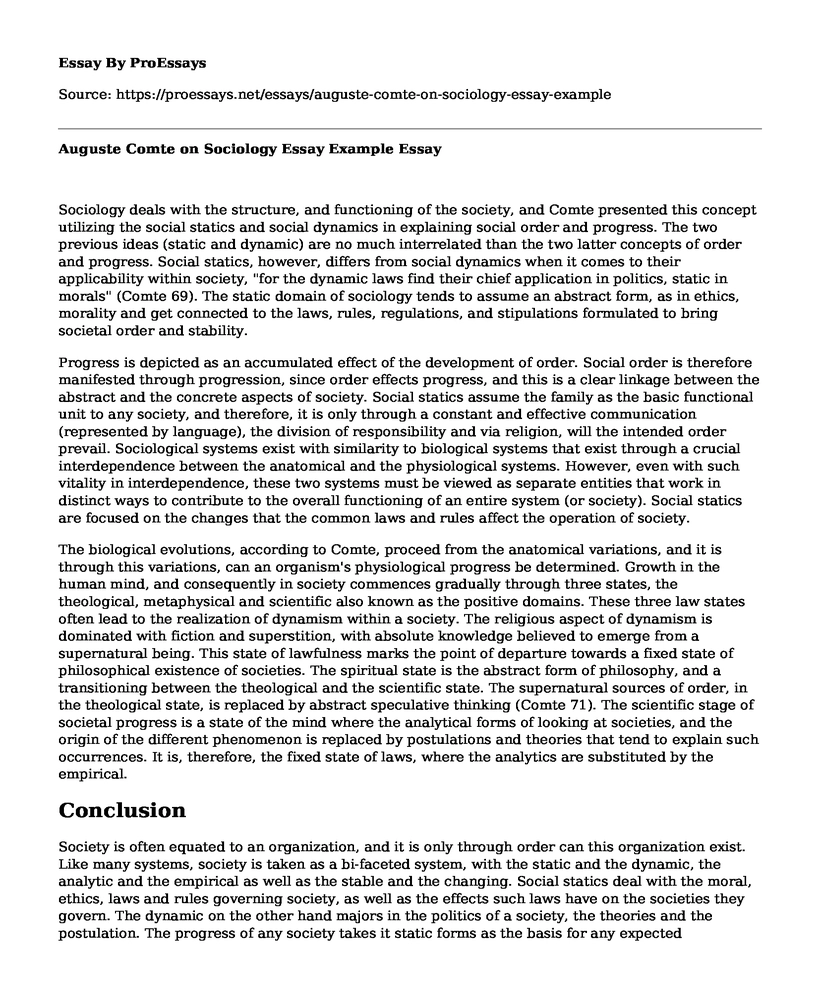Sociology deals with the structure, and functioning of the society, and Comte presented this concept utilizing the social statics and social dynamics in explaining social order and progress. The two previous ideas (static and dynamic) are no much interrelated than the two latter concepts of order and progress. Social statics, however, differs from social dynamics when it comes to their applicability within society, "for the dynamic laws find their chief application in politics, static in morals" (Comte 69). The static domain of sociology tends to assume an abstract form, as in ethics, morality and get connected to the laws, rules, regulations, and stipulations formulated to bring societal order and stability.
Progress is depicted as an accumulated effect of the development of order. Social order is therefore manifested through progression, since order effects progress, and this is a clear linkage between the abstract and the concrete aspects of society. Social statics assume the family as the basic functional unit to any society, and therefore, it is only through a constant and effective communication (represented by language), the division of responsibility and via religion, will the intended order prevail. Sociological systems exist with similarity to biological systems that exist through a crucial interdependence between the anatomical and the physiological systems. However, even with such vitality in interdependence, these two systems must be viewed as separate entities that work in distinct ways to contribute to the overall functioning of an entire system (or society). Social statics are focused on the changes that the common laws and rules affect the operation of society.
The biological evolutions, according to Comte, proceed from the anatomical variations, and it is through this variations, can an organism's physiological progress be determined. Growth in the human mind, and consequently in society commences gradually through three states, the theological, metaphysical and scientific also known as the positive domains. These three law states often lead to the realization of dynamism within a society. The religious aspect of dynamism is dominated with fiction and superstition, with absolute knowledge believed to emerge from a supernatural being. This state of lawfulness marks the point of departure towards a fixed state of philosophical existence of societies. The spiritual state is the abstract form of philosophy, and a transitioning between the theological and the scientific state. The supernatural sources of order, in the theological state, is replaced by abstract speculative thinking (Comte 71). The scientific stage of societal progress is a state of the mind where the analytical forms of looking at societies, and the origin of the different phenomenon is replaced by postulations and theories that tend to explain such occurrences. It is, therefore, the fixed state of laws, where the analytics are substituted by the empirical.
Conclusion
Society is often equated to an organization, and it is only through order can this organization exist. Like many systems, society is taken as a bi-faceted system, with the static and the dynamic, the analytic and the empirical as well as the stable and the changing. Social statics deal with the moral, ethics, laws and rules governing society, as well as the effects such laws have on the societies they govern. The dynamic on the other hand majors in the politics of a society, the theories and the postulation. The progress of any society takes it static forms as the basis for any expected transformations, and this progress commences through the theological, metaphysical and scientific phases. This is in other words, a progression from the supernatural thinking, to abstract speculation and finally to the empirical testing.
Works Cited
Mill Stuart John. Auguste Comte and positivism. October 9, 2005. Pp. 67-72
Cite this page
Auguste Comte on Sociology Essay Example. (2022, Jul 08). Retrieved from https://proessays.net/essays/auguste-comte-on-sociology-essay-example
If you are the original author of this essay and no longer wish to have it published on the ProEssays website, please click below to request its removal:
- Research Paper on Health Care Needs of Bronx-NY Community
- Impacts of Advanced Technology in Studying Modern Society
- Discussion on how Parenting Styles and Attachment Impact the Development of a Child
- Paper Example on SNAP Program: Economic and Political Factors Shaping Its Implementation
- Essay Example on Child Behavior & Career Choice: Who Impacts More?
- Risky Kids: Parental Care's Role in Offences, Drug Abuse, and Health - Essay Sample
- Aristotle and Augustine: How to Live a Good Life - Free Essay Sample







